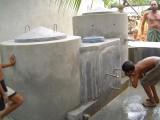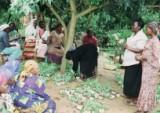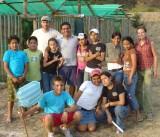
Volume 14, No. 1 | PDF version | Archives
Sign
up for our |
Cottonwood awards $45,000 in grants in 2007
Cottonwood Foundation in your estate planning
What is Cottonwood Foundation?
Give your support to Cottonwood Foundation!
In their own words
Cottonwood awards $45,000 in grants in 2007
In September 2007, Cottonwood Foundation has awarded 22 grants of $1,000 each to grassroots organizations worldwide that are working for a sustainable future. Each of these grant recipients is a Cottonwood Partner.
Following is a listing of the 22 $1,000 grants awarded this fall: (Please note that organizations followed by "USA/[another country]" are based in the United States, but were funded for a specific project in another country.)
- African Blackwood Conservation Project, USA/Tanzania
- to support the Environmental Greenishing Group, a recently formed
organization of youth in the Meru District of Kenya, for establishing
tree nurseries for reforestation, conducting training for the community
on environmental conservation, providing basic environmental education,
facilitating the planting of trees from the nursery to identified areas,
and other activities.
- Benton Furniture Share, USA - to supply approximately
40 items of needed used furniture and household goods at no cost to
low-income elderly individuals and households, primarily in Benton
County, Oregon.
-
Blue Veins, Pakistan - to establish a computer literacy center in Dagai Village, Swabi District, Pakistan in cooperation with a local women's group, which will empower approximately 100 girls and women of this remote village with new skills, with funding to include purchase of a computer, printer, internet connection, and salary for a computer teacher.
- Center for People's Agricultural Plan for the 21st Century,
Philippines - to provide training on agro-forestry for 25 family-based
organic farmers that will incorporate the preservation and protection
of the local forest, including providing seeds of fruit and forest
trees for community reforestation as well as purchasing equipment and
materials needed for tree and vegetable seed storage using non-chemical
pest control methods.
- Centre for Indian Knowledge Systems, India - to
help restore lands in the Nagapattinam District of Tamil Nadu, India
that had been made saline through seawater intrusion in the December
2004 tsunami, by supporting training, seeds, and organic inputs to
100 farmer trainers who will in turn train several thousand local farmers
and NGOs in organic cultivation of salt-tolerant indigenous varieties
of rice, vegetables and other crops.
- Centro de Educacion Creativa, Costa Rica - to purchase
equipment, tools and safety materials to improve CEC's recently developed
Biodiesel Project, which will help the students create recycled energy
that not only fuels the school buses in Monteverde but also helps to
reduce global greenhouse gas emissions, including purchase of a plastic
cone processor, heating pump, tubing and containers, tools, safety
equipment, and other expenditures.
- Cultural Survival, USA/Mongolia - to purchase a
laptop computer for the Totem Peoples Project's Mongolian veterinary
specialist, Ms. Nansalmaa Myagmar, that will be used to document reindeer
and traditional livestock health, treatment history, disease incidence,
ownership patterns, and other data relevant to the management and protection
of the indigenous Dukha nomads of northern Mongolia.
- Ecoclub Nongovernmental Youth Organization, Ukraine
- for the project "The Green Spot in the Grey City" which
will be conducted in Rivne, Ukraine to create a green area in the city
for the benefit of city residents and the urban ecosystem with the
involvement of volunteers and the local community, including purchase
of saplings, soil mix, shovels, delivery of planting materials and
stones, and other expenditures.
- Interaccion para el Desarrollo Sostenible, Bolivia
- to improve the life of children in the small, rural community of
Chijmuni, Bolivia through purchase of building supplies to construct
a needed sanitary facility for a primary school benefiting 60 children,
planting 500 trees near the school, and conducting approximately six
training courses on the environment for primary and secondary students
as well as for teachers and parents.
- International Association for Transformation, Canada/Philippines
- to support the Summer Literacy and Tutoring Program in 5 remote villages
in the Philippines in which approximately 30 senior students provide
needed tutoring and educational upgrading for younger students for
four to five weeks, with the Cottonwood grant providing food and accommodation
for the student teachers, preparation, educational materials, supplies,
transportation, monitoring and evaluation.
- MADRE, USA/Nicaragua - to provide organic food crop
seeds to 20 indigenous Miskito women and their families in Nicaragua
in partnership with local partner organization Mangki Tangni, as well
as facilitating the participation of several indigenous farmers in
a farmers' market (including purchase of tables, transportation for
farmers, and salary for coordinator).
- Maka Foundation, USA (Land Fund) - to help purchase
the 780 acre Medicine Butte Ranch within the Lower Brule Sioux Reservation
that once was Indian-owned land but which had passed to non-Indian
ownership, with future use of the land intended to exclude cattle grazing
and for the land to be managed with the goal of increasing native prairie
wildlife.
- Mangrove Action Project, USA/Indonesia - to support
construction of a Sustainable Agriculture and Environmental Education
Center in Pakem District, Java, Indonesia, including purchase of a
biogas converter, water pump, municipal electrical hook-up, vetiver
grass nursery seed stock for revegetation, and seedlings for an herbal
medicine garden.
- Nabichakha Women Group, Kenya - to help address
waterborne diseases in Bungoma District, Kenya by rebuilding a public
toilet facility that had been destroyed during recent heavy rainfall
and flooding, as well as to initiate a water and sanitation project
that will involve training and community outreach through mass campaigns,
brochures and pamphlets.
- Norwalk/Nagarote Sister City Project, USA/Nicaragua
- to provide scholarships in Nagarote, Nicaragua for 20 "Cottonwood
Scholar" students from low-income families who are attending public
schools, including covering their uniforms, shoes, books, school supplies
and tutoring for one year.
- Project Mercy, USA/Mexico - to construct a sturdy
house from used garage doors as well as partially recycled and donated
materials that will be used by a family in need of emergency housing
in Mexico.
- Rural 21, Moldova - to establish an Annual Winter
School for Bike Mechanics using volunteer experts to train 30 bike
owners in week-long courses as bicycle mechanics, and then to assist
10 of these mechanics to start their own bike shop businesses in their
communities, including purchase of 5 bike mechanic stands, 5 bike wrench
kits, and an electric compressor for inflating and painting.
- Sanchuan Development Association, China - to purchase
450 books and transport them by wagon to each of two remote mountain
village schools in Minhe County, Qinghai Province, which will allow
the schools to have their own libraries, and will encourage education
of ethnic minority children by allowing them access to books in addition
to their textbooks.
- Trees for the Future, USA/Cameroon - to support
the Volunteer Group for Agro-Silvo-Pastoral Development (VOGASPAD)
in Bamenda, Cameroon in providing training for farmers in tree nursery
management, agroforestry and seedling transplantation, including purchasing
wheel barrows, watering pipes, spades, pitchforks and over 30,000 tree
seeds, with the goal of reestablishing vegetation that has been destroyed
by logging and slash-and-burn farming techniques.
- Umoja Wa Kienjero Self Help Group, Kenya - to establish
an eco-seed bank multiplication project that will propagate and package
certified seed spice and herbs, and also fruit orchard seedlings, including
purchase of seeds, equipment, training, and materials.
- White Earth Land Recovery Project, USA - to install
a solar hot air heating panel on the home of a low-income tribal elder
on Minnesota's White Earth Reservation, as well as to train four young
people on the panel's installation.
- Wild Flora and Fauna Fund / FWFF, Bulgaria - to rehabilitate and protect three small spring-fed sources of water in the Yurushki Skali protected area in Kotel Mountain that had been created in the 1950s but have subsequently silted in, for use by people, wildlife, livestock, and aquatic vegetation, with work done by local volunteers
Thanks again to Cottonwood's contributors and volunteers for your support!
You are really making a difference in assisting grassroots organizations
worldwide that are working for a sustainable future.
Cottonwood Foundation in your estate planning
A planned gift to Cottonwood Foundation allows you to continue to
support Cottonwood Foundation’s work for a sustainable future
as part of your legacy to the world. As each state has its own set
of requirements and formalities, to ensure that your planned gift has
been properly made, please consult with your attorney or other professional
advisor. Generally you can use these words to make a bequest through
your will or trust:
I give, devise, and bequeath to Cottonwood Foundation, federal
tax identification number 41-1714008, P.O. Box 10803, White Bear
Lake, MN 55110,
the sum of $_______ (or describe the real or personal property
or portion of the estate) to be used for its general purposes.
What is Cottonwood Foundation?
Cottonwood
Foundation is a tax-exempt charitable organization, run entirely
by volunteers and with no paid staff, that provides small grants
to grassroots organizations worldwide that are working for a sustainable
future. Since it was started in 1992, it has awarded 450 grants totaling
over $417,000. Eleven members currently serve on Cottonwood Foundation’s
board of directors.
Giving Criteria
Cottonwood awards grants to partner organizations that combine
all of the following: protecting the environment, promoting cultural
diversity, empowering people to meet their basic needs, and relying on
volunteers. Support of such groups makes it possible to really make a
difference in creating a better world.
Cottonwood Foundation is proud that more than 90 percent of its expenditures
go directly for grants. Less than 10 percent of all expenses are used
to cover administration (such as postage, printing, supplies and postal
box rental). The Foundation relies on donations of space, graphic design,
computers, telephone, and hundreds of hours of volunteer labor to operate!
Board of Directors
Laura Bray
Jamie Ford, Secretary
Karissa Huntington, Chair
Prabhakar Karri, Treasurer
Kathy Kinzig
Tom Meersman
Craig Miller, Vice Chair
Paul Moss, Executive Director
Erik Nelson
Patrick Waletzko
Caleb Werthh
Give your support to Cottonwood Foundation!
Your
much appreciated contribution can be allocated to one or more funds:
![]() General Fund: Supports
all aspects of the Foundation’s charitable
activities and administration
General Fund: Supports
all aspects of the Foundation’s charitable
activities and administration
![]() Endowment Fund: A permanent fund providing the Foundation with
investment income
Endowment Fund: A permanent fund providing the Foundation with
investment income
![]() Land Fund: Supports grants to indigenous peoples’ organizations
for repurchasing their land base in order to preserve their culture and
environment
Land Fund: Supports grants to indigenous peoples’ organizations
for repurchasing their land base in order to preserve their culture and
environment
Please send contributions made out to "Cottonwood Foundation"
to
Cottonwood Foundation
Box 10803
White Bear Lake, MN 55110
Phone: (651) 426-8797, Fax: (651) 294-1012
E-mail: info@cottonwoodfdn.org
Thank you! Your contribution is tax-deductible as allowed by law.
In their own words
We
thought that you might find of interest these excerpts from three final
reports recently received for Cottonwood grants awarded in Spring 2007:
![]() Safe water for a community in Bangladesh
Safe water for a community in Bangladesh
 "The Arsenic contamination in the water supply of Bangladesh is
a real crisis. Bangladesh is facing the problem of arsenic poisoning
in drinking water. Around 27% of the tubewells, which supply drinking
water to most of the population, have arsenic concentrations above the
government of Bangladesh limit of 50 Pg. per litre. This means that a
quarter of the country's population is exposed to arsenic poisoning which
is alarming and unprecedented in history.
"The Arsenic contamination in the water supply of Bangladesh is
a real crisis. Bangladesh is facing the problem of arsenic poisoning
in drinking water. Around 27% of the tubewells, which supply drinking
water to most of the population, have arsenic concentrations above the
government of Bangladesh limit of 50 Pg. per litre. This means that a
quarter of the country's population is exposed to arsenic poisoning which
is alarming and unprecedented in history.
Goriber Asroys working village Masdia, Kaligonj, is one of the badly
arsenic contaminated village. With the help of Cottonwood Foundation
and the DPHE [Department of Public Health Engineering] Goriber asroy
successfully completed its Arsenic Mitigation projects at Masdia. Installation
and assessment of safe water options was a major activity. The option
promoted was Arsenic Iron Removing Plant (AIRP). 6 AIRP were installed
at Masdia. [The photo above shows one of the AIRPs constructed.]
The people of the project areas were involved in implementing the project.
In a village multiple meetings were held at different stages of the project
to inform and involve the community. At these meetings the potential
safe water option were discussed. Taking into account the opinion of
the villagers, GA proceeded with the demonstration of different alternative
safe water options with no cost to the community. The villagers decided
where the community-based systems would be best located and then committed
to maintaining the system.
Outcomes of the project:
• 72 Families [365 individuals] were get arsenic free drinking
water.
• 5 Courtyard meetings were held at village level.
• Arsenic Prevention Committee (APC) was formed by the open selected
method.
• 2 Courses of training on Arsenic awareness and testing carried out.
• Training Courses conducted for Arsenic Prevention Committee (APC)
members
• Community people’s behavior was changed gradually.
Superstition about arsenic removed from the mind of the villagers.
• Social Crisis related to the ARSENIC became solved.
Thank you for your continuous support to our project. The villagers of
Masdia pay gratitude and homage to Cottonwood Foundation for saving their
life from deadly poison Arsenic. Thank you for you kind cooperation."
-- from Goriber Asroy, Bangladesh
![]() Vegetable growing by Nubian women in Uganda
Vegetable growing by Nubian women in Uganda
 "Please receive our final financial and narrative report for the
grant we received in support of vegetable gardening among the Nubian
Community and selected schools in Entebbe. This grant has indeed made
a difference to the targeted groups.
"Please receive our final financial and narrative report for the
grant we received in support of vegetable gardening among the Nubian
Community and selected schools in Entebbe. This grant has indeed made
a difference to the targeted groups.
We received a grant this year to purchase a variety of vegetable seeds,
farm tools and organic pest control items for vegetable gardening in
ten homesteads among the Nubian community (each with three or four families)
and four primary schools in Entebbe, Uganda including providing training.
The training was conducted by the Agriculture Extension office of Entebbe
Municipal council (Ms. Angela Drania). She was also responsible for the
purchase of the vegetable seeds as well as the pest control ingredients
for the natural pesticides. The tools were procured by Ms. Nakku Christine
Golola a Volunteer with Entebbe District Wildlife Association.
Thirty Nubian women and eight teachers, two from each of the four schools
identified, attended the training bring the total number of trainees
to 38 (thirty eight). The participants were given tools and vegetable
seeds to establish nursery beds in the homesteads and the schools. The
seedlings from the Central Nursery were distributed to the beneficiaries
by the Local Council (LC1) Chairperson...
Project Output:
Type of Vegetable - Numbers planted
Cabbages - 5250
Spinach - 6700
Egg plants - 4360
Green pepper - 5765
Carrots - 16,280
Collards - 4320
Amaranthus ssp - 4620
Onions - 5620
Tomatoes - 1850
Assessment of Achievements
1. The Community have got access to fresh vegetables to supplement the
diets of the Community and students.
2. Sell of surplus vegetables has created an income generating opportunity
for the Nubian women.
3. Vegetable growing has helped the Nubian women diversify from the dominant
weaving of crafts they are engaged in.
4. The beneficiaries learnt good vegetable growing methods.
There is a need to continue supporting the Nubian women. They showed
a lot of enthusiasm during project implementation.
Please extend our appreciation to the members of the Board of Directors
of the Cottonwood Foundation for their continued support in EDWA's activities."
-- from Entebbe District Wildlife Association (EDWA), Uganda
![]() Reforestation in Ecuador
Reforestation in Ecuador
 "Thank you to the Cottonwood Foundation from all of us at Planet
Drum Foundation ( PDF) and in Bahia de Caraquez, Ecuador for your 2007
grant of $1,000. It provided PDF with funds to continue our six kilometer
long revegetation and restoration project and further stabilize the eroded
hillsides that have posed an ongoing threat to the welfare and well-being
of the residents of Bahia de Caraquez."
"Thank you to the Cottonwood Foundation from all of us at Planet
Drum Foundation ( PDF) and in Bahia de Caraquez, Ecuador for your 2007
grant of $1,000. It provided PDF with funds to continue our six kilometer
long revegetation and restoration project and further stabilize the eroded
hillsides that have posed an ongoing threat to the welfare and well-being
of the residents of Bahia de Caraquez."
-- from Planet Drum Foundation, USA/Ecuador (see http://www.planetdrum.org/eco_ecuador.htm to learn more about Planet Drum Foundation's ongoing work in the Ecuadorian coastal city of Bahia de Caraquez, which has committed itself to become ecological and sustainable).
Cottonwood Foundation
Contributors Update
Laurie Gustafson, Editor
Paul Moss, Executive Director
Home | Annual Report | Contribute | Apply for a grant | Newsletter | Questions/Information